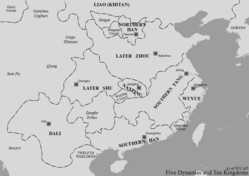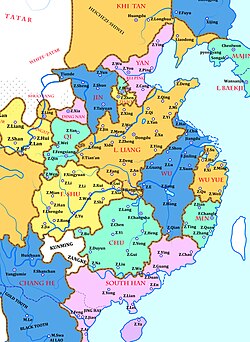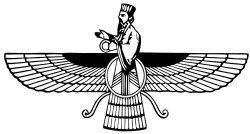Clothing in ancient Shu refers to clothing worn in the Ancient Kingdom of Shu (1046 BC? – c. 316 BC, modern-day Chengdu Plain, Sichuan). Archaeological...
5 KB (472 words) - 06:24, 5 May 2025
Shu (Chinese: 蜀; Pinyin: Shǔ; former romanization: Shuh), also known as Ancient Shu (Chinese: 古蜀; pinyin: Gǔ Shǔ) in historiography, was an ancient kingdom...
16 KB (1,910 words) - 17:21, 5 May 2025
attire of ancient societies. The clothing used in the ancient world reflects the technologies that these peoples mastered. In many cultures, clothing indicated...
50 KB (6,096 words) - 01:50, 14 March 2025
Sichuan Textiles (redirect from Shu embroidery)
Sichuan brocade manufactured in the late 19th century. Ba–Shu culture Byzantine silk Coptic textiles Clothing in ancient Shu Embroidery of India Persian...
9 KB (760 words) - 16:46, 9 April 2025
Shu, referred to as Later Shu (traditional Chinese: 後蜀; simplified Chinese: 后蜀; pinyin: Hòu Shǔ) and Meng Shu (Chinese: 孟蜀) in historiography, was a dynastic...
5 KB (94 words) - 16:19, 7 November 2024
Sichuanese people (category Ethnic groups in Sichuan)
Sanxingdui Sichuan opera Clothing in ancient Shu Church of the East in Sichuan Catholic Church in Sichuan Protestantism in Sichuan Chinese: 四川人; pinyin:...
14 KB (1,312 words) - 13:36, 26 May 2025
dress Central Asian clothing Clothing in ancient Shu Parthian dress Saka clothing Scythian clothing Sogdian clothing Uyghur clothing Sampul tapestry Tocharian...
6 KB (525 words) - 17:25, 12 January 2025
Sanxingdui (category Shu (state))
with the ancient kingdom of Shu, which suggests the presence of a unique civilization in this region before the state of Qin conquered the area in 316 BCE...
28 KB (3,002 words) - 14:44, 25 May 2025
date, the ancient annals treat Sichuan as quite marginal, contradicting the myths. The people of Ba and Shu were literate in Old Chinese, in addition to...
16 KB (1,308 words) - 05:50, 25 May 2025
221–263), known in historiography as Shu Han (蜀漢 [ʂù xân] ) or Ji Han (季漢 "Junior Han"), or often shortened to Shu (Chinese: 蜀; pinyin: Shǔ; Sichuanese Pinyin:...
19 KB (1,541 words) - 21:31, 1 May 2025
Great Shu (Chinese: 大蜀; pinyin: Dàshǔ), known in historiography as the Former Shu (Chinese: 前蜀; pinyin: Qiánshǔ) or occasionally Wang Shu (王蜀), was a...
6 KB (144 words) - 12:35, 14 October 2024
Ba–Shu scripts are three undeciphered scripts found on bronzeware from the ancient kingdoms of Ba and Shu in the Sichuan Basin of southwestern China in the...
5 KB (457 words) - 19:24, 14 October 2024
Shu, after the realm's first polity, the ancient kingdom of Shu. He believed that Zoroastrianism was popular in the region during the Tang dynasty (618–907)...
33 KB (4,187 words) - 06:53, 5 May 2025
vegetables and chili peppers, and Sichuan peppercorns. From its origins in Sichuan cuisine, the dish's popularity has spread throughout China, spawning...
10 KB (929 words) - 09:17, 10 April 2025
Hanfu (redirect from Ancient Chinese Clothing)
traditional Chinese: 漢服; pinyin: Hànfú, lit. "Han clothing") are the traditional styles of clothing worn by the Han Chinese since the 2nd millennium BCE...
268 KB (30,365 words) - 13:43, 22 May 2025
among the known ancient cultures was the Shu State that was independent from the Zhou until it was strategically conquered by the Qin in 316 BCE during...
23 KB (2,436 words) - 05:54, 27 August 2024
mountain in Sichuan province, China. It has an elevation of 7,509 m (24,636 ft) above sea level, as surveyed by the Ministry of Natural Resources in November...
13 KB (1,427 words) - 19:53, 3 May 2025
Qiang people (category Ethnic groups in Sichuan)
cremation. People called "Qiang" have been mentioned in ancient Chinese texts since they first appeared in oracle bone inscriptions 3,000 years ago. Recognized...
24 KB (2,930 words) - 03:41, 26 May 2025
Huanglong Scenic and Historic Interest Area (category World Heritage Sites in China)
body of water starts from the ancient Buddhist/Benbo temple at the top of the valley and ends at the Guests Welcome Pond in the north with a length of 2...
7 KB (537 words) - 09:46, 8 March 2025
Sichuan cuisine (category All Wikipedia articles written in American English)
special background and representative menu. Sichuan cuisine originated in Shu during the Spring and Autumn period and the Warring States period, the beginning...
29 KB (2,612 words) - 02:22, 21 April 2025
Cheng-Han (category Former countries in Chinese history)
in 304 (or by Li Te in 303) and the state of Han (漢; Hàn) founded by Li Shou in 338. The state is also less commonly known as Later Shu (後蜀; Hòu Shǔ)...
14 KB (1,026 words) - 22:58, 27 August 2024
Erlang Shen (category Culture in Sichuan)
the rule of the Shu kingdom. He rose to political power when the great flood that occurred on the twenty-sixth day of the eighth month in 920 AD was reported...
27 KB (3,318 words) - 01:25, 23 May 2025
Mountains in the east. The river passes through the Longmen Mountains and enters the plains of the Sichuan Basin near Dujiangyan. In that area, the ancient Irrigation...
7 KB (680 words) - 08:05, 6 May 2025
Chengjia (category Former countries in Chinese history)
Gongsun Shu in 25 AD after the collapse of the Xin dynasty of Chinese history, rivalling the Eastern Han dynasty founded by Emperor Guangwu later in the same...
11 KB (1,127 words) - 20:19, 21 April 2025
Suining (category Cities in Sichuan)
Sichuan province in Southwest China. According to the 2020 census, Suining had a population of 2,814,196, with 1,612,641 living in built up(or metro)...
16 KB (708 words) - 09:06, 28 March 2025
Guang'an (category Wikipedia articles in need of updating from March 2024)
Guang'an is a prefecture-level city in eastern Sichuan province. It is most famous as the birthplace of China's former paramount leader Deng Xiaoping....
15 KB (594 words) - 09:03, 28 March 2025
Sichuan Normal University (category Universities and colleges in Chengdu)
Chinese: 四川师范大学) is the oldest normal university (teacher's college) located in Chengdu, Sichuan, China. It is the largest provincial key university with...
6 KB (622 words) - 20:13, 17 May 2024
Jiuzhaigou (category World Heritage Sites in China)
dropping 78 m in three steps. Five Flower Lake (五花海, Wǔhuā Hǎi) is a shallow multi-colored lake whose bottom is criss-crossed by ancient fallen tree trunks...
29 KB (3,338 words) - 18:40, 25 May 2025


























